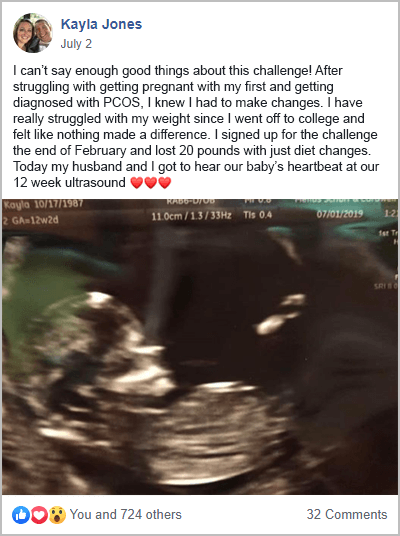For women with PCOS, breakfast is the most important meal of the day. But not in the way you’d assume.
Breakfast presents the first opportunity to heal the gut and keep you well-fueled for the day ahead. By eating nutrient-dense meals you’re also much more likely to make better food choices throughout the day.
If you’re full and satisfied, it’s easier to say no to candy or snacks. This makes a healthy breakfast for PCOS especially useful for improving dietary habits.
Getting better at making breakfast is what we do during my free 30-Day PCOS Diet Challenge. To make these benefits more widely available I’ve shared some of my favorite breakfast ideas for PCOS here.
What Makes A Great PCOS Breakfast Recipe?
There are several steps for adapting to a PCOS diet. These are particularly relevant for making the best breakfast for PCOS:
- Swap processed foods for nutrient-dense whole foods. This helps avoid many of the proinflammatory ingredients used by food manufacturers.
- Exclude as much sugar as possible. Sugar spikes our blood glucose levels and causes systemic inflammation throughout our bodies. It’s possibly one of the most important foods to avoid with PCOS.
- Be smart about fruit. Fresh whole fruit is one of the few exceptions to my “avoid all sugar advice”. But we need to be mindful to not eat too much.
- Eat low-carb, and slow-carb, from whole food sources. Eating a low-carb diet is a great idea for women with PCOS. This is required to achieve the best macros for PCOS. We can make this even better by sticking to whole foods with a low glycemic index.
- Eat fish, meat, and eggs. Women with PCOS tend to be nutrient deficient. In terms of both essential amino acids and many micronutrients that are abundant in animal sources of protein.
- Include plenty of healthy fats. Women with PCOS should be getting 50 – 60% of their calories from fat. Despite all our previous conditioning that “fat is bad,” doing so can have a profound impact on your metabolic health and hormones.
- Replace vegetable oils with healthy fats. As you’ll see from the PCOS diet breakfast recipes below, my idea of a “healthy fat” is broader than that of your typical nutritionist.
- Eat foods that cultivate your gut microbiome. Good health always starts with the gut. It’s one of the essential nine PCOS natural treatments. By cultivating a healthy microbiome we can effect systemic changes to our organs, our immune system, and our brains.
- Eat plenty of non-starchy vegetables. This is an extension of the previous principle, and you’ll see it applied in many of my recipes.
- Cut out gluten and dairy. Many women with PCOS unknowingly suffer from subclinical food intolerances. Gluten and dairy are the most common problem foods.
13 PCOS Breakfast Recipes:
- Sausage McMuffin
- PCOS-Friendly Oatmeal
- Granola Bake
- Spicy Chicken Breakfast Bake
- Breakfast Burrito Bowl
- Pumpkin Pancakes
- Tex-Mex Breakfast Skillet
- Chia & Quinoa Parfait
- Swiss Chard Quiche
- Grab ‘n’ Go Egg Muffins
- Supercharged Green Smoothie
- Nutty Chai Smoothie
- Spicy Veggie Smoothie
PCOS Success Stories
There’s overwhelming evidence showing how dietary change helps you lose weight with PCOS. It’s also the best way to get pregnant with PCOS. Kristin and Kayla illustrate this beautifully. So, what are you having for breakfast tomorrow?


PCOS Breakfast Recipe FAQ
Can I just have a smoothie for breakfast? Yes, which is why I’ve included a few smoothies in this list. Just keep in mind that it’s important to ensure you’re getting enough nutrition from your other meals. A smoothie is unlikely to sustain you as long as a solid PCOS breakfast. So, make sure to prepare some PCOS-friendly snacks and/or a great PCOS lunch.
Can I skip breakfast altogether? Yes. It may technically be better to forgo dinner rather than breakfast. Dropping to two meals a day can be a helpful way to shorten your eating time window. This is important if you’re intermittent fasting. Intermittent fasting is an evidence-based lifestyle intervention that can help treat PCOS [1]. When fasting, it’s to avoid all sources of calories, including those found in beverages.
Can I have oatmeal?Gluten-free oats can be a useful part of a PCOS-friendly diet. But consuming a bowl of regular oatmeal is likely to raise blood sugar levels too high for many PCOS women with insulin resistance. It’s better to have breakfast porridges that are high in fat and lower in carbohydrates. This makes them more aligned with the best macros for PCOS.
What about salt? The risks of too much dietary salt have been talked about for years. But studies have shown that too little salt can lead to increased cardiovascular disease risks. The sweet spot for good health appears to be between 3,000 and 6,000 mg of sodium per day [2]. This is the equivalent of approximately 1.5 to 3 teaspoons.
What about fruit? Fruit should be consumed in moderation, preferably in the presence of healthy fat. 1-2 servings per day are best. When eaten in moderation, any adverse effects of the sugar in fruit are offset by the benefits of fiber, and other nutrients.
What about coffee and caffeine? I answer the question is coffee bad for PCOS here. Coffee can be good for you if you’re in good health. Otherwise, it’s best avoided.
Author
As a Nutritionist, I’m continuing my mission to help women like you, beat PCOS. Evidence-based diet and lifestyle interventions helped me overcome five years of infertility. I fell pregnant naturally after multiple failed IVF cycles. Along the way, my other PCOS symptoms went away too. This experience taught me how to combine the latest science with a pragmatic approach to habit change. I’ve now helped thousands of other women achieve life-changing results, and I love for you to be the next PCOS success story. Learn more about me and what I do here.
Back to Top
References
1Li, C., et al., Eight-hour time-restricted feeding improves endocrine and metabolic profiles in women with anovulatory polycystic ovary syndrome. J Transl Med, 2021. 19(1): p. 148.
2O’Donnell, M., et al., Urinary sodium and potassium excretion, mortality, and cardiovascular events. N Engl J Med, 2014. 371(7): p. 612-23.
As a Nutritionist, I’m continuing my mission to help women like you, beat PCOS. Evidence-based diet and lifestyle interventions helped me overcome five years of infertility. I fell pregnant naturally after multiple failed IVF cycles. Along the way, my other PCOS symptoms went away too. This experience taught me how to combine the latest science with a pragmatic approach to habit change. I’ve now helped thousands of other women achieve life-changing results, and I love for you to be the next PCOS success story. Learn more about me and what I do here.





